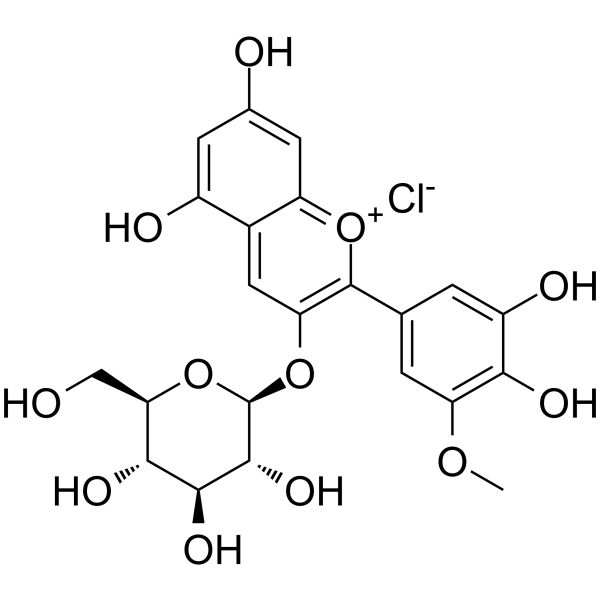
Petunidin-3-O-glucoside chloride
CAS No. 6988-81-4
Petunidin-3-O-glucoside chloride( —— )
Catalog No. M31189 CAS No. 6988-81-4
Petunidin-3-O-glucoside chloride has significantly higher antioxidant activity than the Fe2+ control. Petunidin-3-O-glucoside causes problems in digestibility, may be important dietary supplements with beneficial health effects.
Purity : >98% (HPLC)
 COA
COA
 Datasheet
Datasheet
 HNMR
HNMR
 HPLC
HPLC
 MSDS
MSDS
 Handing Instructions
Handing Instructions
| Size | Price / USD | Stock | Quantity |
| 5MG | 478 | In Stock |


|
| 50MG | Get Quote | In Stock |


|
| 100MG | Get Quote | In Stock |


|
Biological Information
-
Product NamePetunidin-3-O-glucoside chloride
-
NoteResearch use only, not for human use.
-
Brief DescriptionPetunidin-3-O-glucoside chloride has significantly higher antioxidant activity than the Fe2+ control. Petunidin-3-O-glucoside causes problems in digestibility, may be important dietary supplements with beneficial health effects.
-
DescriptionPetunidin-3-O-glucoside chloride has significantly higher antioxidant activity than the Fe2+ control. Petunidin-3-O-glucoside causes problems in digestibility, may be important dietary supplements with beneficial health effects.
-
In Vitro——
-
In Vivo——
-
Synonyms——
-
PathwayOthers
-
TargetOther Targets
-
Recptor——
-
Research Area——
-
Indication——
Chemical Information
-
CAS Number6988-81-4
-
Formula Weight514.9
-
Molecular FormulaC22H23ClO12
-
Purity>98% (HPLC)
-
Solubility——
-
SMILES——
-
Chemical Name——
Shipping & Storage Information
-
Storage(-20℃)
-
ShippingWith Ice Pack
-
Stability≥ 2 years
Reference
molnova catalog



related products
-
Daphnin
Daphnin is one of the main coumarin bioactive ingredients with antibacterial activity. Daphnine is isolated from the entire Daphne fragrance, which is a folk medicine used in China to relieve fever.
-
Valylvaline
Valylvaline (Val-val) is a dipeptide compound that can be used for protein synthesis.
-
Plantagoside
Plantagoside is a specific non-competitive inhibitor for jack bean alpha-mannosidase (IC50: 5 μM). It also is a potent inhibitor of the Maillard reaction.



 Cart
Cart
 sales@molnova.com
sales@molnova.com


